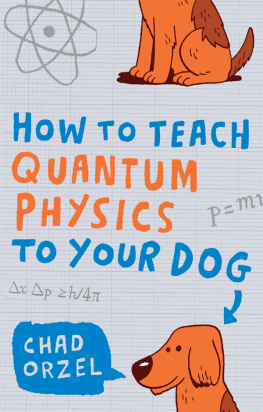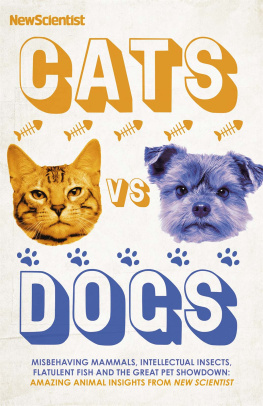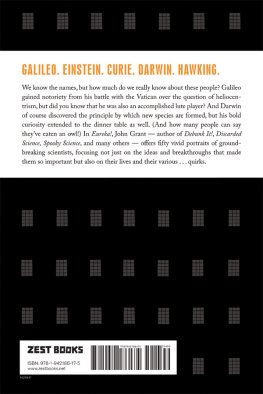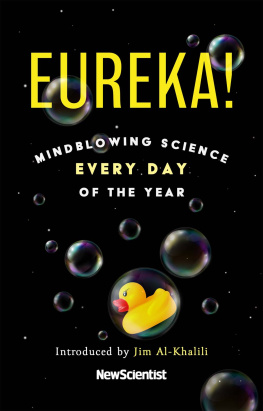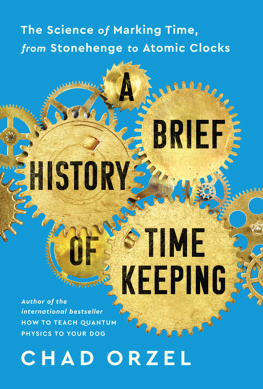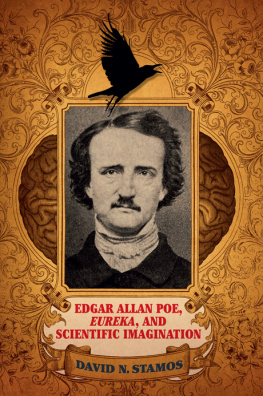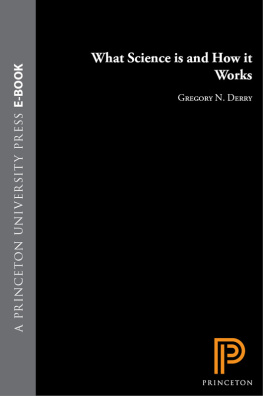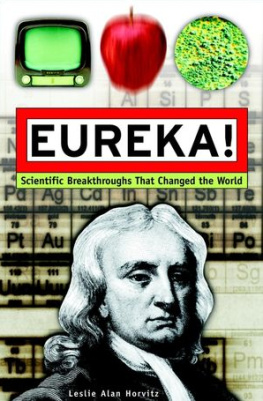
ALSO BY CHAD ORZEL

HOW TO TEACH RELATIVITY TO YOUR DOG
HOW TO TEACH PHYSICS TO YOUR DOG

Copyright 2014 by Chad Orzel
Published by Basic Books,
A Member of the Perseus Books Group
All rights reserved. No part of this book may be reproduced in any manner whatsoever without written permission except in the case of brief quotations embodied in critical articles and reviews. For information, address Basic Books, 250 West 57th Street, New York, NY 10107.
Books published by Basic Books are available at special discounts for bulk purchases in the United States by corporations, institutions, and other organizations. For more information, please contact the Special Markets Department at the Perseus Books Group, 2300 Chestnut Street, Suite 200, Philadelphia, PA 19103, or call (800) 810-4145, ext. 5000, or e-mail .
Designed by Jack Lenzo
A CIP catalog record for this book is available from the Library ofCongress.
Library of Congress Cataloging-in-Publication Data
Orzel, Chad, author.
Eureka! : discovering your inner scientist / Chad Orzel.pages cm
Includes index.
ISBN 978-0-465-04491-7(e-book) 1. SciencePopular works. 2. Discoveries in science. I. Title.Q162.O74 2014
500dc23
2014034615
10 9 8 7 6 5 4 3 2 1
For my parents, whose unfailing support made all of this possible.
CONTENTS

When I brought home my iPad for the first time, before Id finished getting it out of the box, my then three-year-old daughter spotted it and announced, I want to play Angry Birds! I was a little bemused by the idea that the games marketing reached even the preschool set, but I was not particularly unhappy. After all, Angry Birds is a great way to learn about science.
Im not talking about using the game to investigate the physics of birds flung from slingshots, but I mean the process of the game: To succeed at Angry Birds, you need to think like a scientist.well your prediction matches (video-game) reality. If youve guessed correctly, you devastate the pigs and move on to the next level; if your model was incorrect or incomplete, you refine it and try again.
Thats as nice an encapsulation of the process of science as youll find anywhere, and its wildly popular. The original mobile-phone game and its many spin-offs are among the most successful video-game franchises of all time, downloaded over a billion times as of early 2013 and boasting more than 260 million monthly users. Its simple enough that a three-year-old can figure out the basics, and complex enough to be addictive even for adults. Ive lost hours to it myself.
The success of Angry Birds gives the lie to the popular notion that science is something arcane and esoteric, beyond the comprehension of ordinary humans. Even people who openly state that they cant understand and dont like science play Angry Birds and, in the process, use exactly the same bag of mental tricks that scientists do as they try to figure out the basic rules governing the universe. One in every twenty humans alive today devote part of their idle time each month to acting like a scientist, just in the pursuit of one silly video game. All of us, from three-year-olds on up through adults, have a scientist inside us.
LOOK, THINK, TEST, TELL
That may seem like a strange thing to claim. When I say that everyone has an inner scientist, I get a lot of skeptical reactions from people who say, I never use any of the stuff I learned in science class. This reaction confuses two different meanings of science: One is the product of science, the body of knowledge about particles, molecules, animals, planets, and starsfacts that people memorize in science classesand the other is the process of science. The process is, to my mind, the more fundamental and important definition of science.
The process of science consists of four steps:
Look at the world around you, and identify some phenomenon you would like to understand.
Think of a model that might explain how and why that phenomenon occurs in terms of general rules about how the universe operates.
Test your theory with further observations, and carry out experiments to see if the predictions of your model agree with reality.
Tell everybody you know your proposed explanation and the results of your tests.
Clearing a level on Angry Birds requires you to go through the steps of the scientific process.it and share your results with other people via high-score lists and other social features.
This four-step process is the best method we have for generating reliable knowledge about the world. Its also one of the most fundamentally human activities there is, and this process and its products, for good or ill, have made us the dominant species on the planet.
SCIENCE IS WHAT MAKES US HUMAN
In 2011, scientists excavating the Blombos Cave in South Africa unearthed what they described as prehistoric paint kits dated to a hundred thousand years ago: shell containers and simple stone tools bearing traces of colored minerals. The traces on the tools show that these minerals were ground to powder, and traces in the containers indicate that the powder was mixed with charcoal and animal fat to make a paste. Previous excavations had discovered chunks of red ochre from about seventy-five thousand years ago with an angled pattern etched into one of the blocks. These are some of the earliest direct evidence we have of symbolic thinking in humans, with the production of decorative pigments and the deliberate, abstract marking of the raw materials.
These paint-making tools also offer clear evidence of prehistoric science. The minerals used to make the pigments were dug up several kilometers away and brought to the cave. The paste-making involved several components, which were processed separately, then deliberately combined. The traces on one of the grinding stones show that it was first used to grind bits of yellow goethite, then cleaned or resharpened by chipping stone flakes off the end, before being used to grind red ochre.
Taken all together, the artifacts show that as early as one hundred thousand years ago, humans were doing science. They had developed, through trial and error, a complicated, multistep process for producing colored pastes. They had determined which minerals were needed to produce particular colors, located good sources of them, and worked out how to grind and mix them with other materials to produce the desired results. They even knew to use different types of minerals for different colors and took care to avoid mixing them. And they shared that information with others, passing it down through the millennia that the cave was occupied.
For as long as there have been humans, then, there have been humans doing science. The process of looking at the world, figuring out how things work, testing that knowledge, and sharing it with others ought to be taken as one of the defining traits of our species. The process of science is not some incidental offshoot of more general human activity; its the very thing that makes us who we are.
Everything we are as a species can be traced back to the scientific process of discovery by trial and error. Stone tools and weapons let us become predators rather than prey, despite our not having much in the way of natural armament. Clothes made from animal skins and natural fibers let us expand into environments very different from the African plains where we evolved. The development of agriculture led to urban civilizations, which freed up some people to study the world more thoroughly, which fueled further advances, and so on until the modern day, when we thoroughly dominate the surface of the Earth and some distance above it. Not a bad end for some jumped-up apes playing with paint in seaside caves.
Next page

